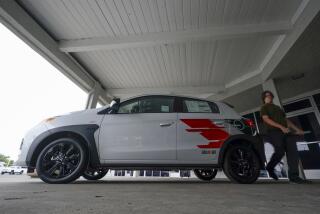Suzuki gives up on U.S. auto market
After watching car sales slowly evaporate at his Suzuki Motor Corp. dealership, K.C. Heidler decided about five years ago to start offering Kia vehicles on his sprawling lot in Santa Ana.
So it came as little surprise this week when Suzuki announced that it would abandon the U.S. car market but continue to sell its motorcycles and ATVs.
“There was a weakening of Suzuki product and a lack of product,” Heidler said, noting that he plans to take down the bright red “S” from the front of his Suzuki Depot dealership. “We had to change the business model to maintain our customers.”
Unlike larger carmakers, the Japanese automaker failed to rebound from the recession as North American car sales plummeted 72% to 30,000 for the fiscal year that ended March 30 from a peak of 107,000 in fiscal year 2008.
That led to Suzuki’s U.S. subsidiary — American Suzuki Motor Corp. in Brea — filing Monday for protection from creditors in U.S. Bankruptcy Court in Santa Ana. It listed $346 million in debts and $233 million in assets at the end of September.
In a statement, Suzuki outlined “serious challenges” for its auto business, including the low sales volume, a dearth of models, the unfavorable exchange rate between the U.S. dollar and the Japanese yen, dealership overhead costs and the U.S. regulatory environment.
“They have low-margin, low-priced cars with small volume,” said Jessica Caldwell, an analyst with auto information company Edmunds.com. “That’s far from the ideal combination.”
Suzuki’s troubles may portend difficulties for other small car manufacturers, such as Mitsubishi, Caldwell said.
“Small companies must find their niche in the U.S.,” she said. “Otherwise, they are going to go the way of Suzuki.”
Suzuki will continue to honor warranties and provide parts and service through its network of 220 dealers nationwide. It will continue to sell cars in foreign markets, including Canada.
Its restructuring plan highlights a return to its roots by focusing on its motorcycle business, as well as all-terrain vehicles and marine outboard engines.
But these product lines also suffered during the recession as consumers’ discretionary spending dried up. Motorcycle and ATV sales in North America fell from 190,000 in fiscal year 2008 to 28,000 in fiscal year 2011, before rebounding to 54,000 last year.
Suzuki’s refocus on its motorcycle and ATV business makes sense to Caldwell, who said the company should fare well because many U.S. consumers associate Suzuki with those vehicles anyway.
Suzuki’s auto product lineup stagnated after the downturn while U.S. carmakers and larger foreign firms, such as Hyundai, Kia and Volkswagen, came out with a host of new models, said Aaron Bragman, an analyst with IHS Automotive.
“They stood by the wayside as other companies came in and ate their lunch,” Bragman said.
Suzuki has had little success winning over U.S. consumers since its entrance into the market in 1985.
In 1986, it started out well with its first automobile in the continental U.S: the four-wheel drive Samurai SUV. Available as a convertible or hardtop, the Samurai powered Suzuki sales from 47,726 units that year to 81,349 units the next year.
But just a year later, Consumer Reports issued a study calling the vehicle unsafe and prone to rollovers — a review that ultimately led to a high-profile lawsuit that the automaker lost.
Still, sales climbed. By 2000, Automotive News was calling Suzuki the fastest-growing Japanese auto company in America. The company’s sales steadily increased in the U.S. until 2008, when the economy began to falter. Last year was one of the worst sales years for Suzuki in the U.S, with just 26,619 cars sold.
The company is behind that pace by roughly 1,000 cars so far this year with 21,188 or a market share of 0.2%, according to researcher Autodata Corp. Toyota Motor Corp. sells nearly that many Corollas in a month.
More to Read
Inside the business of entertainment
The Wide Shot brings you news, analysis and insights on everything from streaming wars to production — and what it all means for the future.
You may occasionally receive promotional content from the Los Angeles Times.











